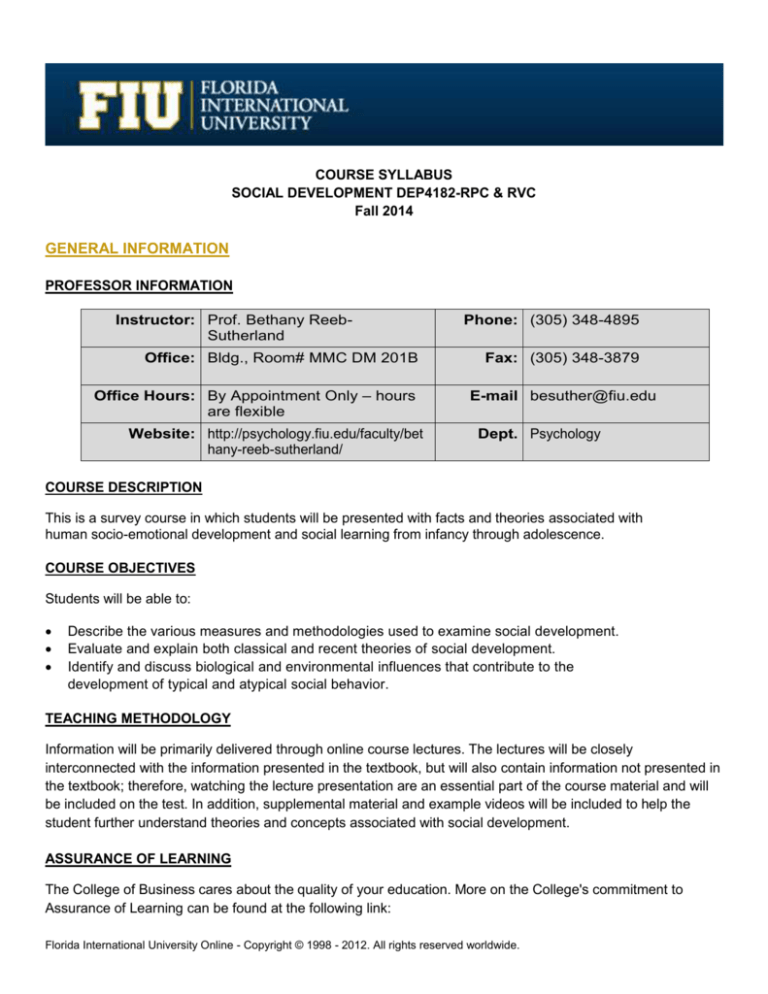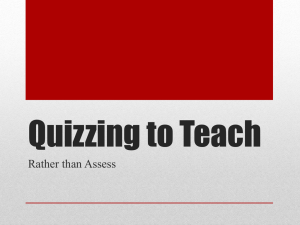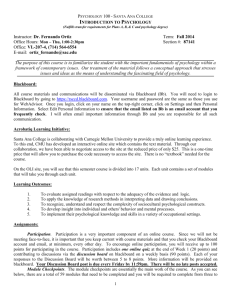
COURSE SYLLABUS
SOCIAL DEVELOPMENT DEP4182-RPC & RVC
Fall 2014
GENERAL INFORMATION
PROFESSOR INFORMATION
Instructor: Prof. Bethany ReebSutherland
Office: Bldg., Room# MMC DM 201B
Office Hours: By Appointment Only – hours
are flexible
Website: http://psychology.fiu.edu/faculty/bet
hany-reeb-sutherland/
Phone: (305) 348-4895
Fax: (305) 348-3879
E-mail besuther@fiu.edu
Dept. Psychology
COURSE DESCRIPTION
This is a survey course in which students will be presented with facts and theories associated with
human socio-emotional development and social learning from infancy through adolescence.
COURSE OBJECTIVES
Students will be able to:
Describe the various measures and methodologies used to examine social development.
Evaluate and explain both classical and recent theories of social development.
Identify and discuss biological and environmental influences that contribute to the
development of typical and atypical social behavior.
TEACHING METHODOLOGY
Information will be primarily delivered through online course lectures. The lectures will be closely
interconnected with the information presented in the textbook, but will also contain information not presented in
the textbook; therefore, watching the lecture presentation are an essential part of the course material and will
be included on the test. In addition, supplemental material and example videos will be included to help the
student further understand theories and concepts associated with social development.
ASSURANCE OF LEARNING
The College of Business cares about the quality of your education. More on the College's commitment to
Assurance of Learning can be found at the following link:
Florida International University Online - Copyright © 1998 - 2012. All rights reserved worldwide.
http://businessonline.fiu.edu/course_addons/Learning_Commitment.pdf
IMPORTANT INFORMATION
POLICIES
Please review the policies page as it contains essential information regarding guidelines relevant to all courses
at FIU and additional information on the standards for acceptable netiquette important for online courses.
TECHNICAL REQUIREMENTS/SKILLS
One of the greatest barriers to taking an online course is a lack of basic computer literacy. By computer literacy
we mean being able to manage and organize computer files efficiently, and learning to use your computer's
operating system and software quickly and easily. Keep in mind that this is not a computer literacy course; but
students enrolled in online courses are expected to have moderate proficiency using a computer. Please go to
the "What's Required" page to find out more information on this subject.
ACCESSIBILITY AND ACCOMODATION
For detailed information about the specific limitations with the technologies used in this course, please click
here.
For more information about Blackboard's Accessibility Commitment, click here.
For additional assistance please contact our Disability Resource Center.
COURSE PREREQUISITES
This course has a prerequisite(s). For more information please click here. Students will be required to have
taken DEP 2000 (Human Growth and Development) or DEP 2001 (Psychology of Infancy and Childhood).
TEXTBOOK
Social Development 2nd Edition
Clarke-Stewart & Parke
John Wiley & Sons (2014)
ISBN: 978-1-118-42518-3
Click here to buy your textbook online at the FIU Bookstore.
EXPECTATIONS OF THIS COURSE
This is an online course, meaning that most of the course work will be conducted online. Expectations for
performance in an online course are the same as for a traditional course; in fact, online courses require a
degree of self-motivation, self-discipline, and technology skills that can make them more demanding for some
students.
Florida International University Online - Copyright © 1998 - 2012. All rights reserved worldwide.
Students are expected to:
Review the how to get started information located in the course content
Take the practice quiz to ensure that your computer is compatible with Blackboard
Interact online with instructor/s and peers
Review and follow the course calendar
Log in to the course at least 3-4 times per week
Respond to emails from the professor within 24 hours
Submit assignments by the corresponding deadline
The instructor will:
Log in to the course at least 4 times per week
Respond to emails within 24 hours
Grade assignments within 5 days of the assignment deadline
COURSE DETAILS
COURSE COMMUNICATION
Communication in this course will take place via Email or through the class Announcements and Discussion
Board.
The Email feature is an external communication tool that allows users to send emails to users enrolled within
the course including the instructor and other students. Emails are sent to the students' FIU email on record.
The Email tool is located on the left side Course Menu (Blackboard user interface). It is understood that some
students do not use their FIU email account for their primary email. However, it is the student’s responsibility to
check their FIU email on a regular basis in order to receive updates in regards to this course.
For more information on professional writing and technical communication click here.
Florida International University Online - Copyright © 1998 - 2012. All rights reserved worldwide.
QUIZZES & EXAMS
In order to mitigate any issues with your computer and online assessments, it is very important that
you take the "Practice Quiz" from each computer you will be using to take your graded quizzes and
exams. It is your responsibility to make sure your computer meets the minimum hardware
requirements.
Please note assessments in this course are not compatible with mobile devices and should not be
taken through a mobile phone or a tablet. If you need further assistance please contact FIU Online
Support Services. If at any time, you experience a problem with taking a quiz or exam, you
must contact FIU Support Services so that there is a record of these problems.
Quizzes
You will be required to take 12 quizzes total (one quiz per chapter; 20 points each).
Each quiz will consist of 10 multiple choice questions (1 points/question).
You are allowed 5 attempts for each quiz and the highest score will be counted toward your
grade.
Quiz questions come from a bank of approximately 60 questions so you may see the same
questions repeatedly mixed in with new questions.
You will have 25 minutes to take each quiz.
There will be approximately one quiz per week unless there is an exam scheduled.
Answers to all of the quiz questions will be posted immediately before the exams. Use
these to study for your exams.
Quizzes will be available for students to take for a full week and will due by Friday 11:59pm
of that week. See below for schedule.
You can study for your quizzes using StudyMate Class which can be found under the tools
menu. Using this tool, you will be able to play games and answer questions that are linked
to the material that you will need to study for the quizzes. You can use these tools to study
the material for each chapter.
Quiz Schedule:
Quiz 1: Available September 1-5, due Friday, September 5th by 11:59pm
Quiz 2: Available September 8-12, due Friday, September 12th by 11:59pm
Quiz 3: Available September 15-19, due Friday, September 19th by 11:59pm
Quiz 4: Available September 22-26, due Friday, September 26th by 11:59pm
Quiz 5: Available September 19-October 3, due Friday, October 3rd by 11:59pm
Quiz 6: Available October 6-10, due Friday, October 10th by 11:59pm
Quiz 7: Available October 20-24, due Friday, October 24th by 11:59pm
Quiz 8: Available October 27-31, due Friday, October 31st by 11:59pm
Quiz 9: Available November 3-7, due Friday, November 7th by 11:59pm
Quiz 10: Available November 17-21, due Friday, November 21st by 11:59pm
Quiz 11: Available November 24-28, due Friday, November 28th by 11:59pm
Quiz 12: Available December 1-5, due Friday, December 5th by 11:59pm
Exams
Exams include 2 midterms (100 points each) and 1 final (100 points).
Midterm 1 will cover material from Chapters 1-6, Midterm 2 will cover material from
Chapters 7-9, and the final will cover material from Chapters 10-12.
Exams will consist of short answer essay questions, matching, fill-in-the blanks, and
multiple-choice questions.
There are NO makeups of the exams. If you have a conflict in your schedule, you can
take the exam ahead of time.
You will have 2 hours to take each midterm exam and 3 hours to take the final.
Exams will be available for a 24-hr time window.
Florida International University Online - Copyright © 1998 - 2012. All rights reserved worldwide.
Exam scores will be posted within 5 days after taking the exam.
Exam Schedule:
Midterm 1: October 13 by 11:59pm
Midterm 2: November 10 by 11:59pm
Final Exam: Available December 8-12, due December 12th by 11:59pm
ASSIGNMENTS
Group Assignment: Creating a Wiki
You will be required to complete a Wiki page within Blackboard (100 points total; 20
points for initial outline; 80 points for final product).
This is a Group Assignment. You will be assigned to a group of 8-9 other students.
You will also be assigned a specific topic related to social development. You will
research the topic using your textbook, papers assigned by the professor, and the
internet to create a wiki page through Blackboard. More specific details about the
assignment will be given at a later time.
As a group, you will choose a group leader. The group leader will be responsible for
proofreading and organizing the wiki. The other members of the group will be
responsible for providing the material for the wiki. You will be responsible for keeping in
contact with other group members over the course of the assignment.
Points will be given based upon the amount of effort each group member puts into the
project as well as the clarity and organization of the wiki.
Toward the end of the semester, students will be able to view other students’ wiki
pages.
Group Assignment Due Date:
Outline: September 26 by 11:59pm
Final wiki: December 5 by 11:59pm
Extra Credit Assignment
You will be given the opportunity to earn up to 30 extra credit points by either
participating in studies through the SONA system (5 points maximum) or creating quiz
questions for each chapter (5 points/question set). There is a 30-point maximum for
extra credit so if you complete more than this, you will only be awarded 30 points.
Study Participation:
You can sign up to participate in research studies through https://fiu.sonasystems.com. If you do not have an account already, you must request one. You
will be given 1 extra credit point for every hour or partial hour in which you
participate. You must show up for your studies on time or cancel well ahead of
schedule. If you do not show up for more than 2 appointments, you will not be
allowed to earn additional extra credit by participating in studies. Please be
considerate of other’s time. The maximum amount of extra credit that can be earned
via study participation is 5 points or 5 total hours of participation.
Creating Quiz Questions:
You will be asked to create 5 multiple choice questions for each chapter with at
least 4 possible answers. Be sure to highlight the correct answer to get full credit.
These assignments will be submitted through TurnItIn. Each of these assignments
is worth 5 points.
Extra Credit Due Date:
December 5 by 11:59pm
Florida International University Online - Copyright © 1998 - 2012. All rights reserved worldwide.
GRADING
Letter Grade
Letter Grade
Range (%)
A
B+
BC
D+
D-
Above 92
87-90
81-83
74-76
67-70
61-63
Points
592-640
554-579
516-534
471-489
426-451
388-406
Letter Grade
Range
AB
C+
CD
F
91-92
84-86
77-80
71-73
64-66
<61
COURSE REQUIREMENTS
Points
580-591
535-553
490-515
452-470
407-425
≤387
WEIGHT
Quizzes
Wiki Assignment
Midterm Exams
Final Exam
Total
38%
15%
32%
15%
100%
Total Points
240
100
200
100
640
COURSE CALENDAR
MODULE 1: Theories, Themes, and Tools for Discovery (Chapters 1 & 2)
August 25th – September 12th
Upon successful completion of Module 1: Theories, Themes, and Tools for Discovery, you will be able
to:
Identify and discuss the central themes or debates surrounding developmental psychology.
Describe both historical and more recent theories of social development.
Compare and contrast various paradigms and designs used in social developmental research.
Understand various terms used in the design of developmental studies.
MODULE 2: Early Tasks of Social Development (Chapters 3, 4, 5, & 6)
September 15th – October 13th
Upon successful completion of Module 2: Early Tasks of Social Development, you will be able to:
Discuss how both biological and environmental factors influence social development.
Understand and discuss differences and similarities between temperament and attachment.
Differentiate and define different categories of temperament and attachment styles.
Outline the developmental course of emotions and discuss the role of emotions in social
development.
Discuss how development of self-concept and language contribute to social development.
MODULE 3: Contexts of Social Development (Chapters 7, 8, & 9)
October 14th – November 10th
Florida International University Online - Copyright © 1998 - 2012. All rights reserved worldwide.
Upon successful completion of Module 3: Contexts of Social Development, you will be able to:
Discuss how families and peers influence social development.
Recognize influences of school and media on social development.
Contrast the positive and negative impacts that the family, peer, and school contexts can have
on social development.
MODULE 4: Processes and Products of Social Development (Chapters 10, 11, & 12)
November 11th – December 5th
Upon successful completion of Module 4: Processes and Products of Social Development, you will be
able to:
Identify biological and social influences on gender and discuss the role of gender in social
development.
Outline the course of moral development and discuss the role of morality in social development.
Define different types and patterns of aggression and discuss biological and social influences on
the development of aggression.
WEEKLY SCHEDULE
DATE
Intro
Module 1
Aug 25-29
TASKS
Review the How to Get Started information located in the Course Content
Introduction to the course
Start review of Chapter 1
Complete practice quiz
Module 1
Sep 1-5
Sep 1 – Labor Day (University Closed)
Complete review of Chapter 1
Start review of Chapter 2
Quiz 1 due Friday Sep 5 by 11:59pm
Module 2
Sep 8-12
Complete review of Chapter 2
Start review of Chapter 3
Quiz 2 due Friday Sep 12 by 11:59pm
Module 2
Sep 15-19
Complete review of Chapter 3
Start review of Chapter 4
Quiz 3 due Friday Sep 19 by 11:59pm
Module 2
Sep 22-26
Complete review of Chapter 4
Start review of Chapter 5
Quiz 4 due Friday Sep 26 by 11:59pm
Wiki outline due Friday Sep 26 by 11:59pm
Module 2
Sep 29-Oct 3
Complete review of Chapter 5
Start review of Chapter 6
Quiz 5 due Friday Oct 3 by 11:59pm
Module 2
Oct 6-10
Complete review of Chapter 6
Quiz 6 due Friday Oct 10 by 11:59pm
Module 3
Start review of Chapter 7
Florida International University Online - Copyright © 1998 - 2012. All rights reserved worldwide.
Oct 13-17
Midterm Exam 1 due Monday Oct 13 by 11:59pm
Module 3
Oct 20-24
Complete review of Chapter 7
Start review of Chapter 8
Quiz 7 due Friday Oct 24 by 11:59pm
Module 3
Oct 27-31
Complete review of Chapter 8
Start review of Chapter 9
Quiz 8 due Friday Oct 31 by 11:59pm
Module 3
Nov 3-7
Complete review of Chapter 9
Quiz 9 due Friday Oct 31 by 11:59pm
Module 4
Nov 10-14
Nov 11 – Veterans Day (University Closed)
Start review of Chapter 10
Midterm Exam 2 due Monday Nov 10 by 11:59pm
Module 4
Nov 17-21
Complete review of Chapter 10
Start review of Chapter 11
Quiz 10 due Friday Nov 21 by 11:59pm
Module 4
Nov 24-28
Nov 27 & 28 – Thanksgiving (University Closed)
Complete review of Chapter 11
Start review of Chapter 12
Quiz 11 due Friday Nov 28 by 11:59pm
Module 4
Dec 1-5
Complete review of Chapter 12
All Extra Credit due Friday Dec 5 by 11:59pm
Final Wiki Assignment due Friday Dec 5 by 11:59pm
Quiz 12 due Friday Dec 5 by 11:59pm
Dec 8-12
Complete Final Exam by Friday Dec 12 by 11:59pm
Florida International University Online - Copyright © 1998 - 2012. All rights reserved worldwide.







